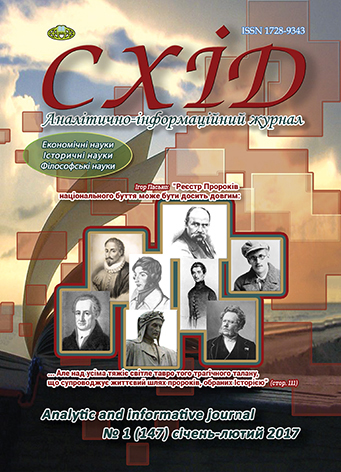Conceptualization of subject in Heidegger and Badiou: a search for common grounds
DOI:
https://doi.org/10.21847/1728-9343.2017.1(147).97561Keywords:
subject, Dasein, concept, ontology, man, subjectityAbstract
Heidegger and Badiou are not likely to be received as philosophical figures inheriting much in common. The only obvious ground which backs both thinkers is that of ontology as primary focus of their intellectual endeavors. However, this is divergence between their philosophies what makes an attempt to reveal some other conceptual foundations their doctrines have in common so important for a historian of the recent transformations in philosophy. The concept of subject looks as an indicator of differences between Heidegger and Badiou, since Heideggerian destruction of the metaphysics of subject is opposed by positive and affirmative indoctrination of subject developed by Badiou. Affirmative concept of the subject implies certain references to Heidegger's negative hermeneutics of the Modern subjectivity where it says about reactionary subject or dark subject. As we see Badiou skillfully attunes his conception to the profound destructivity of Heidegger's negation of subject. What these two thinkers share is certainly the need for a middle term between totality and unifying force of being and particularity and contingency of the individual human life, which would be efficient in denoting the very transition of the particular into the common. The early Heidegger of decisive Dasein can be regarded as a forerunner of the Maoist revolutionary subject of Badiou, with its prophecy of becoming a historical driving force and gathering the strength of the particular around a traumatic Event. For both Heidegger and Badiou the "movement" of truth (for Heidegger - a permanent projection of Dasein's Being in the mode of authenticity) proceeds trough a series of choices which cannot be governed by a law or "an algorithm." The indiscernible truth forces a subject to permanently find him/herself amid the "undecidable." The procedure of fidelity traverses the existent knowledge. One can scarcely know (due to a sort of epistemic technology) whether an event has taken place, one can rather bet upon its truth. For both philosophers the concept of truth is indissolubly connected with the problems of ethics (ontologically understood). Heidegger points to the "most primordial truth," which is the "truth of existence." Abiding in this truth, Dasein discloses itself to itself and discovers its ownmost potentiality-for-Being.
Downloads
References
Heidegger, M. (1977), Sein und Zeit, Vittorio Klostermann, Frankfurt am Main, 600 S.
Heidegger, M. (1976), Wegmarken, Vittorio Klostermann, Frankfurt am Main, 202 S.
Badiou, A. (2009), Theory of the subject, Continuum, London, New York, 367 p.
Badiou, A. (2005), Being and Event, Comtinuum, New York, 526 p.
Badiou, A. (2009), Logics of worlds, Continuum, London, 617 p.
Harman, G. (2012), Badiou’s relation to Heidegger in Theory of Subject. In: Badiou and philosophy, Edinburgh University Press, Edinburgh, pp. 225-243.
Hunter, I. (2016), Heideggerian mathematics: Badiou’s Being and Event, Representations, Vol. 134 , No. 1, Pp. 116-156. DOI: 10.1525/rep.2016.134.1.116
Cherniakov, A. (2010), Truth and infinity in Heidegger and Badiou, available at: http://artesliberales.spbu.ru/events/afisha/doklady-konferencii-abpolitika-edinogo.-predely-fragmentacii-i-usloviya-vozmozhnoi-solidarnostibb/Aleksei%20CHernyakov.pdf
Skyrtach, V. (2014), Transformation of the subject in the clinical discourse of the 20th century philosophy, LANDON-XXI, Donetsk, 274 p.
Karpenko, A. (2013), The category of subject in Martin Heidegger’s philosophy: exposition of the problem, Scientific Notes. Series: Philosophy, Vol. 14, pp. 111-114.
Karpenko A. (2013), Alain Badiou’s ontology of subject, in: Novikov B. (ed). Marxism and the present: polit-economical, philosophical and sociological dimensions of the global crisis, NTUU “KPI”, Kyiv, pp. 90-91.
Downloads
Published
How to Cite
Issue
Section
License
Copyright (c) 2017 Viacheslav Stepanov, Iryna Novychenko

This work is licensed under a Creative Commons Attribution-NonCommercial-NoDerivatives 4.0 International License.
1. Authors bear responsibility for the accuracy of facts, quotations, numbers and names used.
2. Manuscripts are not sent back.
3. The publisher does not always agree with the authors' opinion.
4. The authors reserve the right to authorship of the work and pass the first publication right of this work to the journal under the terms of a Attribution-NonCommercial-NoDerivatives 4.0 International, which allows others to freely distribute the published research with the obligatory reference to the authors of the original work and the first publication of the work in this journal.
5. The authors have the right to conclude separate supplement agreements that relate to non-exclusive work distribution in the form in which it has been published by the journal (for example, to upload the work to the online storage of the journal or publish it as part of a monograph), provided that the reference to the first publication of the work in this journal is included.

